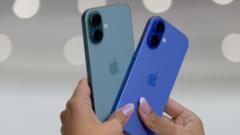The tech giant acknowledges and addresses errors in its AI summaries that misled users about news events, with a promise of future improvements.
Apple to Revise AI News Feature Following BBC's Call for Action

Apple to Revise AI News Feature Following BBC's Call for Action
Apple announces updates to its AI-driven news alerts after inaccuracies lead to complaints from the BBC.
Apple has confirmed that it will make updates to its artificial intelligence (AI) news alert feature, instead of pausing its use, in response to recent complaints from the BBC regarding misleading notifications. Following an instance where its AI-generated summary incorrectly reported that Luigi Mangione, accused of killing UnitedHealthcare CEO Brian Thompson, had shot himself, the tech company engaged with the concerns raised.
The BBC had voiced its dissatisfaction with Apple last month after the inaccuracies in AI notifications had become evident, including a false claim that Luke Littler was the PDC World Darts Championship winner before the event had even started and a sensational misleading report about tennis star Rafael Nadal. The BBC expressed that Apple's summaries not only misinform readers but also undermine the credibility of major news outlets, including itself.
In its announcement, Apple stated it was actively working on software modifications to "further clarify" when notifications are AI-generated summaries. This marks Apple’s first formal acknowledgment of the BBC's complaints. "These summarisations by Apple are spreading misinformation, which does not reflect—and in some cases completely contradicts—the original BBC content," said an official from the BBC on Monday.
The notification summaries by Apple are intended for users to have a consolidated view of important updates; however, their rollout has raised concerns regarding accuracy. These features, launched in the UK in December, are currently limited to specific iPhone models and select devices running on the latest iOS.
Apple aims to release the software update addressing these issues in the coming weeks and has encouraged users to report any unexpected notifications they encounter. The BBC's struggle with Apple’s AI tools highlights a broader challenge faced by many tech companies venturing into generative AI solutions, which have met mixed reviews and varying degrees of success.
Besides Apple, Google also faced scrutiny last year over its AI-generated content, prompting Gary Liu, a spokesperson for Google, to classify such issues as isolated incidents rather than systemic failures. As generative AI technologies continue to evolve, concerns regarding reliability and accuracy in disseminated information remain prevalent among both users and news organizations alike.
The BBC had voiced its dissatisfaction with Apple last month after the inaccuracies in AI notifications had become evident, including a false claim that Luke Littler was the PDC World Darts Championship winner before the event had even started and a sensational misleading report about tennis star Rafael Nadal. The BBC expressed that Apple's summaries not only misinform readers but also undermine the credibility of major news outlets, including itself.
In its announcement, Apple stated it was actively working on software modifications to "further clarify" when notifications are AI-generated summaries. This marks Apple’s first formal acknowledgment of the BBC's complaints. "These summarisations by Apple are spreading misinformation, which does not reflect—and in some cases completely contradicts—the original BBC content," said an official from the BBC on Monday.
The notification summaries by Apple are intended for users to have a consolidated view of important updates; however, their rollout has raised concerns regarding accuracy. These features, launched in the UK in December, are currently limited to specific iPhone models and select devices running on the latest iOS.
Apple aims to release the software update addressing these issues in the coming weeks and has encouraged users to report any unexpected notifications they encounter. The BBC's struggle with Apple’s AI tools highlights a broader challenge faced by many tech companies venturing into generative AI solutions, which have met mixed reviews and varying degrees of success.
Besides Apple, Google also faced scrutiny last year over its AI-generated content, prompting Gary Liu, a spokesperson for Google, to classify such issues as isolated incidents rather than systemic failures. As generative AI technologies continue to evolve, concerns regarding reliability and accuracy in disseminated information remain prevalent among both users and news organizations alike.





















